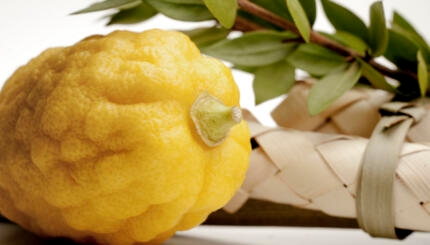I don’t remember the date in September—even though, beginning on Labor Day, my son reminds me several times—but I have the Hebrew date imprinted in my memory. It is the 21st of Tishre, the seventh day of Sukkot, Hoshana Rabbah.
Tomorrow.
We won’t light a yahrzeit candle or recite a prayer, despite that our personal practice tends toward traditional observance of rituals. Perhaps because we are more traditional it seems inappropriate to memorialize a family pet in the same way one would a human. Still, I wish to honor her memory, so I create a technological memorial.
I change my Facebook profile picture to one of her lounging in the sukkah, just days before her death, and friends comment to comfort me with their memories of her life. I tweet a link to what could be called her obituary, a blog post about our ten years together. I feel a twinge of guilt—thinking these small acts of remembrance are somehow disloyal to our new dog—and resolve to post some photos of her after the holiday.
Discussing these newly-created rituals, my spouse asks, “Do you think animals have souls?”
I reply “yes” without hesitation. Not because I am one of those “dog people” (I am) or because I am a pantheist (I’m not), but because I believe it, feel it, deep in my soul. I spend several days formulating a well-reasoned reply. Something to extend the discussion beyond, “of course animals have souls; humans are animals, after all.” If the soul is the essence of life, the very thing that distinguishes sentient beings from inanimate objects, then humans are different from other animals not because we possess souls but because we have language with which we acknowledge God the Creator of souls.
While I’m remembering, my thoughts turn to Hoshana Rabbah, a strange interruption of the joy of the Sukkot season. During the morning prayers, the liturgical tradition is to return to the haunting melody of Yom Kippur because—while the book of life is sealed and the gates of repentance are closed at the end of Yom Kippur—the rabbis allowed for the possibility that during Sukkot we could nudge God toward granting forgiveness. Hoshana Rabbah is an extended deadline for atonement; some Jews symbolically cast off their sins by beating the willow branch until its leaves fall away.
Last year when I beat the willow branch, I was picturing Jenna waking up on the final day of her life and praying for the return of her soul to its creator. Tomorrow, when I participate in this ancient ritual, I will acknowledge our creator and engage my soul in remembering Jenna.
Moved by this post? Join the conversation through MyJewishLearning’s weekly blogs newsletter.
Sukkot
Pronounced: sue-KOTE, or SOOH-kuss (oo as in book), Origin: Hebrew, a harvest festival in which Jews eat inside temporary huts, falls in the Jewish month of Tishrei, which usually coincides with September or October.
Yom Kippur
Pronounced: yohm KIPP-er, also yohm kee-PORE, Origin: Hebrew, The Day of Atonement, the holiest day on the Jewish calendar and, with Rosh Hashanah, one of the High Holidays.



